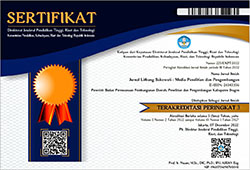PERUBAHAN FOKUS SISTEM PENYULUHAN PERTANIAN INDONESIA UNTUK MERESPONS TRANSFORMASI SISTEM PANGAN GLOBAL
DOI:
https://doi.org/10.32630/sukowati.v7i2.428Kata Kunci:
berbasis pasar, desentralisasi, modal sosial, penyuluhan pertanian, perubahan fokusAbstrak
Transformasi sistem pangan global berdampak pada petani skala kecil di negara-negara berkembang, khususnya Indonesia. Dalam konteks globalisasi, walaupun intensitas tanam cenderung meningkat, pendapatan petani cenderung menurun dan tidak stabil karena volatilitas harga komoditas di pasar dunia. Jika sistem penyuluhan terus bertahan pada strategi abad ke-20 yang berfokus pada tanaman pokok, maka baik petani maupun sistem penyuluhan tidak akan mampu bersaing secara efektif dengan perusahaan multinasional yang menguasai rantai pangan dari hulu ke hilir. Jika hal ini terus berlanjut, sistem penyuluhan nasional kemungkinan akan mengikuti pola sistem penyuluhan pertanian di Amerika Utara, Eropa, dan Oseania yang secara bertahap dirampingkan atau dibubarkan sama sekali. Penelitian ini bertujuan untuk menjawab pertanyaan: perubahan-perubahan apakah yang diperlukan oleh sistem penyuluhan pertanian Indonesia agar dapat merespons globalisasi dan/atau transformasi sistem pangan global? Metode penelitian yang digunakan adalah tinjauan literature. Hasil penelitian menunjukkan bahwa sistem penyuluhan pertanian Indonesia masih memiliki kesempatan memberikan kontribusi besar dan tahan lama dalam meningkatkan pendapatan dan mata pencaharian petani kecil. Sistem penyuluhan perlu mengubah fokusnya yaitu beralih ke tanaman bernilai tinggi, membentuk kelompok usaha, menjadi berbasis pasar, membangun modal sosial, dan pindah ke struktur penyuluhan yang terdesentralisasi. Fokus penyuluhan abad ke-21 tersebut bisa dilaksanakan, namun membutuhkan adanya kepemimpinan dan komitmen yang berkelanjutan.
Unduhan
Diterbitkan
Cara Mengutip
Terbitan
Bagian
Lisensi
Hak Cipta (c) 2023 Muhammad Ibnu

Artikel ini berlisensi Creative Commons Attribution 4.0 International License.


















